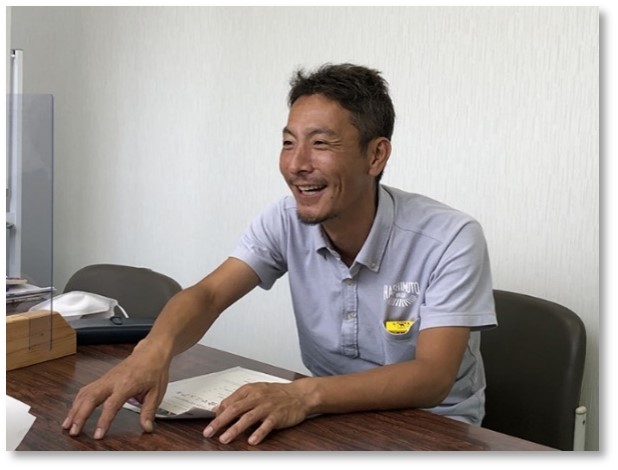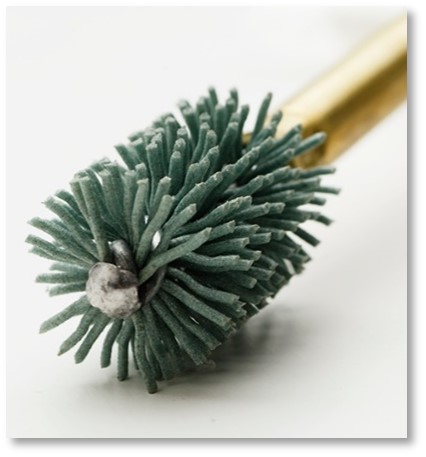Hashimoto Brush
September 21, 2022
Regarding overseas exports
Ishimura:Who are your main business partners?
Sugawara:Our business partners are located throughout Japan, and we also export overseas.
Ishimura:Which countries do you export to?
Sugawara:We export to countries such as South Korea, Thailand, and Vietnam. We used to export to Hungary as well, but not anymore.
Ishimura:What was the reason for exporting overseas?
Sugawara:I have always been interested in overseas markets, but at first, I didn't really know how to approach them and how to enter the market. In 2011, after the Great East Japan Earthquake, I received an email from JETRO saying that companies from Iwate, Miyagi, Fukushima, Ibaraki, and Chiba Prefectures could exhibit for free at the Canton Fair in China as part of the efforts to support the disaster-stricken areas. So, I decided to participate in the exhibition and take a look at the overseas market.
Ishimura:How was your experience after participating?
Sugawara:It was my first overseas exhibition, so I learned a lot from it. It was also good to meet manufacturers from other prefectures. I also received inquiries from companies in China and Korea at the exhibition.
Ishimura:So, that was your first business negotiation with overseas companies?
Sugawara:Yes, it was. The first company I negotiated with was a drill manufacturer in Korea. They were looking for a brush to polish the hole after drilling. We provided samples and finally reached an agreement in 2012, and the business continued for about half a year to a year. We don't have any business with them now, but it was a good experience.
Ishimura:It must have been tough to have your first business transaction with a foreign company.

Sugawara:It was definitely a series of difficulties. First of all, as you might expect, we couldn't communicate well due to the language barrier (laughs). We had to use an interpreter or speak in broken English, but the nuances didn't come across well. We both ended up in a state of confusion, like, "What do you want to do?" or "What are you trying to say?" Since our company doesn't sell standardized products but creates fully customized products based on customers' needs, it's hard to move forward with negotiations if that doesn't come across well. Even for cleaning brushes, there are various factors to consider, such as the number of bristles, the material, and the degree of cleaning required. It's not just about cleaning; it's also about how to clean it, whether to polish or remove burrs, and the specifications can vary greatly depending on the product or part being cleaned and the degree of cleaning required.
Ishimura:That's the biggest difference in communication difficulties between domestic and international transactions.
Sugawara:Yes. In Japan, discussions about specifications that would usually take one or two days to end up taking more than a week. It was really tough. And when the samples were ready and we had to send them, we had to pay for shipping. The other party didn't mention anything about the shipping costs and just said, "Just send it for now" (laughs). In the end, we had no choice but to bear the shipping costs and send the samples. Continuously experiencing this kind of situation, I became really anxious about whether it was really okay and whether we would make a profit. But somehow, we managed to reach a formal agreement.
Ishimura:How did you settle the payment for the transactions?
Sugawara:It was payment in advance. We asked the other party to make the payment first, and once the payment was confirmed, we would send the products to Korea.
Ishimura:How did you find your subsequent trading partners?
Sugawara:After that, we started participating in overseas industrial exhibitions such as Automechanika and other related exhibitions once or twice a year. For about two years, we visited various markets in different countries and learned a lot. Regarding China, we found that the market was very large and attractive, but we felt that it was not a suitable place for our products to be sold. Of course, we buy materials from China, and we consider China to be a very promising source of materials. However, there are many local competitors, and the quality awareness of the Chinese people is significantly different from ours. Therefore, we felt that China was not the right market for our products.
Ishimura: I see. On the other hand, when the Ibaraki Prefecture Small and Medium Enterprise Promotion Public Corporation set up a joint exhibition booth in METALEX in Thailand in 2017, you were one of the first to participate. Did you consider Thailand to be a promising market?
.jpg)
Ultra small diameter brush(外径Φ0.4mm)
Sugawara:Yes. Actually, at that time, we had already looked at various overseas markets as a company and had conducted trade with overseas companies. As a result, we decided not to sell directly to local buyers, but to target Japanese companies that had already entered the local market. At that time, we were in the process of negotiating with an automobile parts manufacturer in Japan, and we had realized that there was also a demand for cleaning brushes in their overseas factories. However, in the case of Japanese companies, they do not have the decision-making power to improve production in the local market, so we also needed to approach their headquarters in Japan. Therefore, we thought that it would be best to attack both domestically and internationally, and we aimed to make contact with Japanese companies in the local market by participating in METALEX in Thailand.
Expansion from overseas exhibitions
Ishimura:If it's a Japanese company, can't you just do business in Japan?
.jpg)
M-Tech KANSAI(IBARAKI booth)
Sugawara:Of course, that's right. However, we are a small and medium-sized enterprise. Although there are many manufacturers in Japan, small and medium-sized entrepreneurs like us will be turned away at the reception desk if we try to visit major manufacturers for sales. There are also many competing small and medium-sized enterprises in Japan. So, we have no choice but to let major manufacturers find us and create opportunities for business negotiations. That's why our company actively participates in domestic trade shows and exhibitions, but overseas exhibitions in particular have a different level of visibility.
Ishimura:Are overseas exhibitions more effective?
Sugawara:Yes. For example, at a major domestic manufacturer that is our client, the business divisions of the domestic and overseas factories were completely separate departments. As a result, it was difficult for us to reach the overseas factory's business department, but when our company exhibited at an overseas exhibition in Thailand, we were able to meet the person in charge of the overseas factory who had come to see the booth. This was a significant breakthrough. As a result, that major manufacturer is now using our products not only at their domestic factories but also at their factory in Thailand.
Ishimura:I see. So exhibiting at overseas exhibitions means that you can stand out more than your competitors in Japan.
Sugawara:Yes. Originally, after investigating the overseas market for cleaning brushes for several years, we felt that Japanese products had more stability than local companies' products and would not easily switch to local companies' products, so the only thing left was how to meet major manufacturers.
Ishimura:Exhibiting at overseas exhibitions was the best sales strategy.
Sugawara:Recently, deliveries to overseas factories have been increasing, which is very encouraging. Also, as I mentioned earlier, I felt that China is not a sales destination, but in recent years, it seems that the movement toward "China Plus One" at major companies has been accelerating, so we are considering targeting countries beyond that. In that sense, the existence of overseas exhibitions, where we can catch information quickly, is very important.
Ishimura:You are exhibiting with Japanese trading companies at overseas exhibitions. Why is that?

Deburring Brush
Sugawara:The biggest hurdle for manufacturing companies exporting products is handling when trouble occurs with the product. Even if it's just a brush that's integrated into part of the equipment, if trouble occurs, we, as the seller, have to respond. However, as a small and medium-sized enterprise, it is difficult for us to travel overseas immediately to respond to issues when they arise. It takes time and money. That's why we incorporated trading companies into our business flow in advance. Trading companies have a strong network overseas, and they can handle various situations even if trouble occurs. They can also provide information on local regulations and so on, which is very helpful for us. That's why we exhibit with trading companies at overseas exhibitions.
Ishimura:As a manufacturing company, after-sales service is essential.
Sugawara:If it's a Japanese trading company, you can feel at ease, and it's faster to partner with a trading company to find business partners than to contact local companies one by one.
Previous articles Back to list Next articles






